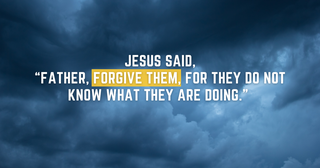
- Recent Translations
- All Translations
Luke 23:34
Share
Settings
Images for Luke 23:34

Luke 23:34 in Other Translations
Luke 23:34 Meaning and Commentary
Then said Jesus, Father, forgive them
When he was crucified between the two thieves, and as he hung upon the cross, and while insulted and abused by all sorts of men, and put to the greatest pain and torture, he addressed himself to God his Father: the Arabic version reads, "my Father", who was so to him, not as he was man; for as such he had no father; but as he was God, being as a divine person, his beloved, and only begotten Son: and this he uses, whilst, as man, he is praying to him; partly to express his faith of relation to him; his confidence of being heard; and partly to set believers an example of praying, as he has directed, saying, "our Father" and the petition put up by him is for forgiveness; which is with God, and with him only; and that for his enemies, his crucifiers: not for those who sinned the sin unto death, the sin against the Holy Ghost, who knowing him to be the Messiah, maliciously crucified him, for whom prayer is not to be made; but for those who were ignorantly concerned in it, as the next clause shows, even for his own elect, whom the Father had given him out of the world, which were among his crucifiers; for those, and not the world, he prays: and the fruit of this his prayer quickly appeared, in the conversion of three thousand of them under Peter's sermon on the day of Pentecost, next following, in six weeks time. Though such might be his affection, as man, in general, as to wish for, and desire, as such, was it consistent with the divine will, forgiveness for all of them; adding,
for they know not what they do,
or "are doing", meaning, in crucifying him, which was the case of many of them, and of their rulers; they did not know that Jesus was the Messiah, nor the prophecies concerning him, nor the evil they were committing in putting him to death: not that their ignorance excused their sin; nor was it without sin; nor does Christ use it as a plea for pardon, or found his intercession upon it, which is always done upon his own propitiatory sacrifice; but this is mentioned as descriptive of the persons Christ prays for, and points out a branch of his priestly office he exercises, in having compassion on the ignorant, and them that are out of the way;
and they parted his raiment, and cast lots:
that is, upon his vesture, or seamless coat, and so fulfilled the prophecy in ( Psalms 22:18 ) . (See Gill on Matthew 27:35). (See Gill on John 19:23). (See Gill on John 19:24).
Luke 23:34 In-Context
Related Articles
Footnotes 1
- [a] Some early manuscripts do not have this sentence.

